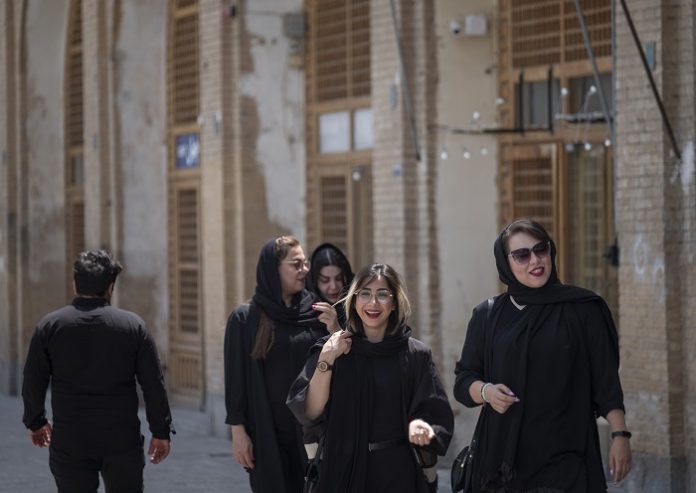
By Parisa Hafezi
DUBAI, Nov 6 (Reuters) – Donald Trump’s victory in the U.S. presidential election drew mixed reactions among ordinary Iranians, with some fearing a heightened risk of war and economic hardship but others hoping his hardline stance might bring political change in Iran.
“I am so glad Trump won. I hope he continues his maximum pressure on the Islamic Republic and that it leads to the collapse of this regime,” housewife Zohre, 42, told Reuters by phone from Tehran.
Some Iranians like retired teacher Hamidreza feared further economic pressure with Trump in the White House if he continues the same tough policy he adopted in his 2017-2021 first term.
“I am disappointed Trump won. It means more economic pressure, the risk of a war with Israel. I am deeply concerned,” said Hamidreza, 66, in the northern city of Rasht.
“I don’t care who the U.S. president is. My main concern is Iran’s economy. If they lift sanctions on Iran, that would be a good thing,” said government employee Nader, 34, a father of two in the southern city of Ahvaz.
“Everyone is happy, and I am thrilled. Trump is a no-nonsense leader who will put pressure on the clerical rulers. This is good for the Iranian people who seek a democratic leadership,” said Parastou, a 21-year-old student in Tehran.
Like Zohre, Hamidreza and Nader, Parastou declined to be identified in full due to the sensitivity of the issue.
Publicly, Iranian political leaders have downplayed the significance of the U.S. election result on Tehran’s policies.
However, the establishment’s main concern is the potential for Trump to empower Israeli Prime Minister Benjamin Netanyahu to strike Iran‘s nuclear sites, conduct assassinations and reimpose his “maximum pressure” policy through heightened sanctions on the country’s oil industry.
Some, however, suspect Trump will be cautious about the possibility of war.
“Trump is a businessman. He knows Iran is powerful and can turn the Middle East to hell if attacked. He wants to end wars in the region not fuel it,” said Reza Mohammadi, a member of Iran‘s volunteer Basij militia in the central city of Isfahan.
‘WE HAVE TO MAKE A DEAL’
In 2018, the then-Trump administration exited Iran‘s 2015 nuclear pact with six major powers and reimposed harsh sanctions on Iran, prompting Tehran to violate the pact’s nuclear limits, such as rebuilding stockpiles of enriched uranium, refining it to higher fissile purity and installing advanced centrifuges to speed up output.
Efforts to revive the pact have failed, but Trump said in his campaign in September that “We have to make a deal, because the consequences are impossible. We have to make a deal”.
It was the bite of U.S., EU and U.N. sanctions over Tehran’s nuclear program that forced Tehran to reach the 2015 nuclear pact, under which Iran agreed to curb its nuclear program in exchange for lifting sanctions.
Trump’s tough stance could force Iran‘s Supreme Leader Ayatollah Ali Khamenei, who has the last say in the country’s foreign and nuclear policy, to approve talks “whether direct or indirect” with the United states, two Iranian officials told Reuters on condition of anonymity.
After casting his vote, Trump told reporters that “I don’t want to do damage to Iran, but they cannot have nuclear weapons”.
Iranian analysts and insiders did not dismiss the possibility of a detente between Tehran and Washington “without restoring diplomatic ties”.
“Iran will act based on its own interests. It is possible that secret talks between Tehran and Washington take place. If security threats against the Islamic Republic are removed, anything is possible,” said Tehran-based analyst Saeed Laylaz.
While facing off against arch-foe Israel, Iran’s clerical leadership is also concerned about the possibility of an all-out war in the region, where Israel is engaged in conflicts with Tehran’s allies in Gaza and Lebanon.
In an election speech in October, Trump stated his unwillingness to go to war with Iran, but said Israel should “hit the Iranian nuclear first and worry about the rest later”, in response to Iran‘s missile attack on Israel on Oct. 1.
Israel retaliated with airstrikes on Iranian military targets, especially missile production sites, on Oct. 26.
Trump, 78, recaptured the White House on Wednesday by securing more than the 270 Electoral College votes needed to win the presidency, Edison Research projected.
(Writing by Parisa Hafezi, Editing by William Maclean)

